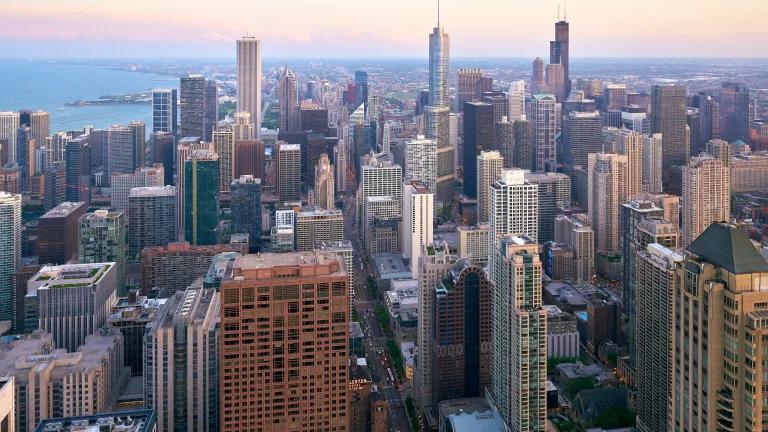NRDC Supports Full Fracking Ban in the Delaware River Basin

Authored by New York Program Assistant Jhena Vigrass
NRDC testified at two public hearings in favor of a full ban on fracking and fracking-related activities in the Delaware River Basin last week. The hearings took place in Waymart and Philadelphia, Pennsylvania, and were hosted by the Delaware River Basin Commission (DRBC), the body responsible for regulating activities affecting water quality in the Delaware River Basin.
The hearings were dominated by members of the public who voiced support for a full fracking ban. While several fracking industry representatives and supporters spoke against the proposed ban in Waymart, many more landowners, scientists and advocates spoke in support of a full ban. And supporters of a full fracking ban represented the overwhelming majority in Philadelphia.
Late last year, after years of advocacy by NRDC and allies in the region, the DRBC released draft regulations banning fracking in the entire watershed, which, if implemented, would make permanent the de facto moratorium on fracking that was put in place in 2010. However, these draft regulations also permit the transport, treatment, and disposal of fracking wastewater in the Basin, and the use of Basin water for fracking elsewhere. If enacted, these provisions have the potential to critically endanger this watershed and drinking water for generations to come.
To truly protect people’s health, our communities, and the environment, the Commission must implement a full ban on fracking that includes all aspects of this dangerous practice.
You can help protect the Delaware River Basin from the dangers of fracking: submit a comment to the DRBC here!

Below are our statements made before the DRBC last week:
“I’d like to make 3 points:
“FIRST, NRDC strongly supports a ban in the Delaware River Basin.
“Fracking can and has contaminated air and drinking water, ruined landscapes, caused earthquakes, harmed human health, and contributed to climate change.
“Over 600,000 jobs, or more than $12 billion in annual wages, rely on a clean and protected River Basin for survival. Factoring in ecosystems services, over $16 billion are imperiled if the River Basin is opened to fracking. The potential value of the natural gas industry, a mere $3.3 billion per year, pales in comparison, at nearly a fifth of the economic value of a frack-free Basin.
“SECOND, while we strongly support a ban, the effectiveness of a fracking ban is undermined if wastewater, one of the most toxic aspects of the fracking process, can still be transported, treated, and disposed of within the River Basin.
“The fracking process yields wastewater containing over 1,000 contaminants that can cause significant harm to human health and the environment. Here is a list of chemicals that is found in fracking wastewater.
“While some of these chemicals are benign, such as water and citric acid, many of these chemicals are toxic to humans and animals, are radioactive, and corrosive. They can imperil ecosystems by depleting oxygen or causing algal blooms, and they can interact with disinfectants at drinking water plants to form cancer-causing chemicals.
“And there is no safe way to handle, treat, and dispose of fracking wastewater. As we’ve seen just next door in Susquehanna County, even when there are strict regulations in place, where there’s wastewater, there are spills, and these spills pollute our water, destroy habitats, and make people sick.
“NRDC is currently conducting a detailed review of the effects of fracking wastewater on human health and the environment. We’ll be sharing this report with you as part of the public comment process, and we hope you’ll find it useful.
“THIRD, these regulations should not allow for the withdrawal of water for fracking elsewhere. As you know, fracking uses enormous volumes of water, approximately 3-5 million gallons per well per frack, and nearly all of that water is lost to the fracking process. Unlike other water uses, almost none of the fracking water can be returned to the Basin after use, depriving every Basin state of the use of that water for more beneficial purposes, like, drinking, farming, and fishing.
“Thank you again for taking the time to hear us out today. The decision as to whether or not to permit fracking and fracking wastewater in the River Basin is likely one of the most important decisions the Commission will make in the coming years.
“We ask that you do the right thing and make this ban a full ban that bans fracking, fracking wastewater, and the withdrawal of water for fracking purposes.”
—KIM ONG, STAFF ATTORNEY
“Over the past several weeks, I have looked closely at the effects of fracking on the health and environment of the Susquehanna River Basin, an area directly adjacent to the Delaware River Basin. Since 2003, the Susquehanna River Basin has been open to fracking. We only need to look there to see how fracking and its wastewater may affect the Delaware River Basin.
“Through my research, I have concluded that fracking simply cannot happen without accidents. Wastewater spills into waterbodies. Gas wells blow out. Both fracking fluid and methane contaminate drinking water. And these accidents, despite seemingly strict regulations on fracking and its wastewater, happen routinely, on an almost weekly basis. It’s no wonder four miles of the Susquehanna River were downgraded by Pennsylvania’s Department of Environmental Protection because they failed to meet water quality standards.
“I’ll share with you just a few of the many incidents I came across in my research.
“In Dimock, 8,000 gallons of fracking fluid spilled into wetlands from faulty supply pipes. The spill polluted streams and resulted in a massive fish die-off. Residents’ drinking water turned brown and flammable. After showering, Dimock residents experienced dizziness and headaches and suffered from skin sores.
“In Bradford County a well spilled thousands of gallons of fracking fluid into a tributary of the Susquehanna River. The spill took 12 hours to contain, and 7 families who lived in the area had to evacuate their homes.
“Finally, in Wyoming County, a well spilled hundreds of thousands of gallons of fracking wastewater into the nearby area. The mixture of sand, water, hydrochloric acid, and thousands of other toxic chemicals spewed out of the well at a rate of 25,000 to over 30,000 gallons per hour. The spill took 18 hours to contain. Multiple families had to evacuate, and the road to the site was blocked off.
“These are just a small sample of the accidents that have happened next door in Susquehanna, but they demonstrate the toxicity of fracking, whether that be the drilling of wells or the handling and transportation of waste water. We cannot afford to make the same mistake in the Delaware River basin, and I implore the Commission to enact a full ban on fracking, inclusive of fracking wastewater and water transfers in the Delaware River Basin.”
—CLIO GATES, NEW YORK REGIONAL INTERN
“We’ve seen here in Pennsylvania, and across the country, that gas drilling and wastewater treatment and storage industrializes our communities. People living in proximity to drilling and wastewater injection wells are on record experiencing respiratory issues, pregnancy complications, PTSD, endocrine abnormalities, among other symptoms.
“While the regs include a ban, that proposed ban is currently rendered incomplete. Specifically, the regs create a possibility of opening the Watershed to storage, treatment, disposal and discharge of fracking wastewater, and allowing the withdrawal of fresh water for fracking elsewhere. This would be a step backwards.
“Opening the river basin to any aspect of fracking, would imperil the air, water, land, and the health of our communities for generations to come. Instead of relying on dirty and dangerous fossil fuels of the past, we must transition and diversify our local economies toward industries that do not destroy our drinking water, pollute our land, and make our loved ones sick.”
—ROB FRIEDMAN, POLICY ADVOCATE



